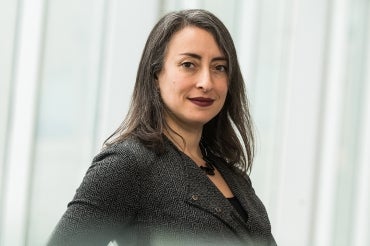Leah Cowen appointed U of T’s first associate vice-president, research

Published: November 20, 2020
Professor Leah Cowen, chair of the department of molecular genetics in the Temerty Faculty of Medicine and an expert on infectious fungal diseases, has been appointed the University of Toronto’s first associate vice-president, research.
The newly created role will see Cowen tasked with enhancing supports for U of T’s scholars, mobilizing funding and boosting even further the quality and impact of research across the university’s three campuses. She will begin the position on March 1, 2021 for a four-year term.
A Canada Research Chair in Microbial Genomics, co-director of the CIFAR program Fungal Kingdom: Threats & Opportunities and co-founder and chief scientific officer of biotechnology firm Bright Angel Therapeutics, Cowen said it’s “a real honour and privilege” to take on such a critical role at a world-leading research institution.
“The transition to this new role as associate vice-president, research, is a very exciting one at this stage, providing a wonderful opportunity to engage and support a much broader portfolio of research and scholarship across the university,” said Cowen, who will step down as chair of the department of molecular genetics.
“It’s been a really incredible experience to work with students, faculty and staff over the past four and a half years as chair of molecular genetics to enable our mission in research and education to thrive.”
Cowen’s new role will involve collaboration with leaders of academic divisions and U of T’s Research Advisory Board. She will also work closely with U of T’s Centre for Research Innovation and Support (CRIS) to develop mentoring opportunities and workshops for faculty members, and support the development of a university-wide research infrastructure roadmap.
University Professor Ted Sargent, U of T’s vice-president, research and innovation, and strategic initiatives, said he created the position of associate vice-president, research after discussions with academic leaders across the three campuses revealed a need for a leader with the experience, energy and vision to mobilize research supports and funding and champion the work of our world-class faculty.
He said the new position will play a crucial role in the university’s efforts to remain a research and innovation powerhouse, and that Cowen is perfectly suited for the responsibility.
“Professor Cowen is the ideal scholar and leader to assume this exciting new role due to her outstanding track record of inter-disciplinary scholarship, high-impact research and teaching excellence; her proven track record in knowledge translation and entrepreneurship; and her leadership both within the University of Toronto as well as with partner organizations such as CIFAR,” Sargent said.
"Over the course of her career, Professor Cowen has secured some $30 million in research funding, published more than 100 high-impact research articles, mentored numerous undergraduate, graduate and post-doctoral researchers, championed the work of fellow faculty and co-founded a company that’s on the cutting edge of the development of therapeutics to treat life-threatening infections.”
Cowen received her undergraduate degree from the University of British Columbia and her PhD from U of T before pursuing post-doctoral studies at the Whitehead Institute at the Massachusetts Institute of Technology. In 2007, she returned to U of T as an assistant professor in the department of molecular genetics, eventually rising to the rank of full professor and chair of the department in 2016.
Her lab studies various aspects of the biology of fungal pathogens and the mechanisms through which microbes cause disease – and explores ways to counter microbes’ drug resistance and treat the life-threatening infections that they cause.
Cowen said she looks forward to tailoring U of T’s research infrastructure roadmap to support current and future research endeavours.
“Research requires technologies, it requires facilities and it requires [the realization] that these can change as science, technology and infrastructure requirements evolve,” Cowen said.
“It’s key that we have a coherent strategy that looks across the infrastructure requirements for research across the phenomenally diverse communities of the University of Toronto – what we have in place as well as looking forward to what we’re going to need over the next 10 years and beyond.”
Cowen also identified mentorship and support for faculty members as critical to ensuring their individual success, as well as boosting the strength of the university as a whole.
“Mentorship is key. It’s absolutely crucial,” she said. “Part of my work in this space will involve working with the Centre for Research Innovation and Support to develop workshops in which faculty members can help educate one another and share best practices on broader strategic approaches, as well as processes to raise the quality, impact and resourcing for our scholarly research.
“This is an exciting mission and it will do more than just enhance success – it will build community.”



